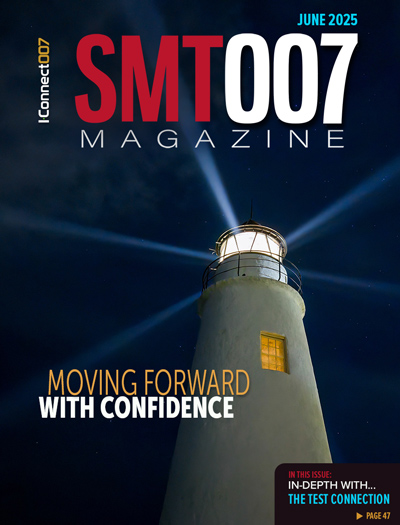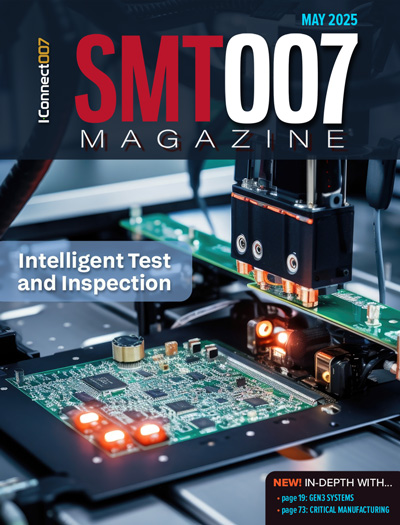-

-
News
News Highlights
- Books
Featured Books
- smt007 Magazine
Latest Issues
Current Issue
What's Your Sweet Spot?
Are you in a niche that’s growing or shrinking? Is it time to reassess and refocus? We spotlight companies thriving by redefining or reinforcing their niche. What are their insights?

Moving Forward With Confidence
In this issue, we focus on sales and quoting, workforce training, new IPC leadership in the U.S. and Canada, the effects of tariffs, CFX standards, and much more—all designed to provide perspective as you move through the cloud bank of today's shifting economic market.

Intelligent Test and Inspection
Are you ready to explore the cutting-edge advancements shaping the electronics manufacturing industry? The May 2025 issue of SMT007 Magazine is packed with insights, innovations, and expert perspectives that you won’t want to miss.
- Articles
- Columns
- Links
- Media kit
||| MENU - smt007 Magazine
An EMS with a Nimble Global Footprint Makes a Big Splash at electronica
November 23, 2016 | Judy Warner, I-Connect007Estimated reading time: 12 minutes
I enjoyed a unique and refreshing outlook from Alwyn Rea at the recent electronica trade show in Munich. Alwyn is director of business development for non-automotive products at ALL CIRCUITS, a French-based EMS company offering a broad base of products and services from around the globe, specialized in the automotive industry. Street-smart and customer-savvy, bundled with a sound financial base, this may be a company to watch in 2017.
Judy Warner: Thank you for joining me, Alwyn. Please tell us a little bit about ALL CIRCUITS.
Alwyn Rea: Thanks for dropping by, Judy. We're a medium-sized player, and to put that into context, we’re around 300 million Euro turnover, in the top three in France, top 10 in Europe, and top 50 globally. We're not one of the major players who everybody knows by name, but we like to think we've found our niche, and our niche is being light on our feet, competitive, with an interesting footprint for our customers.
Warner: So, you're outside of the hot seat in the top 10 globally, do you have any plans for expansion?
Rea: Well, we don't have a plan for global domination. We have a plan to grow profitably and to grow in a controlled way, so that's where we're from. We come from the automotive sector, so the automotive side drives everything that we do. It's a good school in terms of quality, in terms of lean, in terms of controlling your costs, and in terms of being reactive. We use automotive as a vector which drives all our sectors of activity, including medical, industrial, connected objects, and little niches like helping startups. We've always got three or four startups on the go, advising them, helping them bring their products to market to the right price, and hoping that they have huge success.
Warner: Taking a long-term view of potential opportunities seems like a good business model I think.
Rea: Thank you. Yeah, we try. The market is pretty tough and competition is tough when you speak to a lot of EMS companies. We've all got machines, and mostly the same machines, so it's about how we're organized around those machines. How can we be reactive? How can we be proactive? I've got 30 years in the industry, and one of the things that EMSs have traditionally been bad at is being proactive, providing solutions to the customer, suggesting things like, "Hey why didn't you think about this?" We've got an advantage that we're in lots of areas and activities, so we see stuff that some of our customers maybe don't have the time to see, and it's our job to help them be competitive in their marketplace. That's maybe a little differentiator that we have.
Warner: I would say that's correct. I come from an EMS side of things and not all, but many EMS companies tend to be more on the reactive side. They wait until the customer brings them the problem, rather than projecting what’s coming.
Rea: That's something that we're trying to improve on and we've got real concrete examples of that. We've now got R&D facilities and, above and beyond that, now we have customers who just come to us with a written spec and we deliver them a product which is ready for sale in the different markets that they've selected. They don't even see their product anymore. That's a real extreme example, but that's where the market is going.
Warner: I think you're right. It’s not uncommon to see OEM product packaged in pallets at an EMS company that ship directly to customers or distribution centers.
Rea: We try and help our customers, but obviously, there are different entry points and exit points. Not all our customers want R&D, not all our customers want advice from us, but we can't be smarter than our customers or know their markets better than they do themselves. What we have to do is offer them the option of being able to say, "We can design it for you, we can build it for you, or we can build the final product for you. We can give you some good advice as to how you can build it better and have better quality." We build 120,000 PCBAs in one of our plants per day in the automotive sector in Western Europe at 2.7 ppm over a year, so not in low cost. That's not an accident if you can deliver that sort of quality levels, so we'd like to think that we've got a strong base which gives us the credibility to advise our customers if that's what they want.
Warner: And you have a design center in France?
Rea: Well firstly, our strategy is that none of the sites compete with one another. It's stupid to start fighting in-house. Just to take on your first point we do things in a pretty atypical way. We don't feel we have to copy our competitors particularly, so we do some really crazy stuff. I know that it's true in the States, and it's also true in Europe, that you design in the States and you design in Europe and then subcontract the manufacturer in China. We have customers where we do the design in China and we manufacture in Western Europe.
Warner: That's unique.
Rea: We have 1,200 people in our Tunisian plant where we do low-mix, high-volume work. Most people in low cost countries are doing high volume, low mix work, so we're pretty atypical as a company and what we do is we try and listen to what our customers want and deliver it. What we find is some of the bigger EMSs tend to want to explain to the customers how they should do business with them. What we try to do is say, "We're going to listen to you and we'll do our damnedest to try and put the solution you want." Every customer is different in terms of reactivity, traceability, and the services they want, so we try and be pretty adaptable. I guess a lot of other EMSs say that as well, but we believe one of our real USPs is that willingness to listen to our customers and really to try our best to put the solution in that they want.
Warner: When you said, "EMS and adaptability" in the same sentence I thought you were confused for a moment. (Laughs)
Rea: It's difficult! It's a tough marketplace. We've never seen a context in the market like we've seen in the last two years. Most of our customers, big corporates, have more and more trouble predicting their own marketplaces. So you could have a contract in place saying, "There’s three months of firm orders and after that flexibility," but most of customers don't know what they want next week, so we'd be stupid to force them to give us three months, as much as we'd like that. But then a customer will say, "I know you didn't see this coming guys, neither did we, but here's an order for 50,000 pieces." Now what do we say to them? That it wasn't in the forecast and we're not going to do it, or that we're going to try and fulfill this as best we can for them? That's where the future is, being local and being reactive. It has nothing to do with machines, and nothing to do with technology. Everyone has machines, everyone can place these components, but it's how you organize yourself logistically frontend, your relationship with suppliers, and how you organize yourself backend with all the logistics and distribution moves.
Page 1 of 2
Suggested Items
System Basis Chip Market Size Worth USD 66.30 Billion by 2032, at a CAGR of 11.40%
07/18/2025 | Globe NewswireAccording to the SNS Insider, “The System Basis Chip Market was valued at USD 25.10 billion in 2023 and is projected to reach USD 66.31 billion by 2032, growing at a CAGR of 11.40% from 2024 to 2032”.
TI Honored by Volkswagen Group for Operational Excellence
07/16/2025 | Texas InstrumentsTexas Instruments (TI) received the prestigious “Operational Excellence” award at the annual Volkswagen Group Award 2025 in Wolfsburg, Germany.
Japan's Car Industry Has Highest Robot Installations in Five Years
07/15/2025 | IFRThe Japanese automotive industry installed a total of about 13,000 industrial robots in 2024. This is an 11% increase compared to the previous year and the highest level recorded since 2020.
GlobalLogic, Volvo Cars Deepen Collaboration to Engineer the Future of Mobility
07/09/2025 | GlobalLogicGlobalLogic Inc., a Hitachi Group Company and leader in digital engineering, has announced it has been selected in Volvo Cars’ partnership ecosystem as one of the strategic partners within engineering services globally.
KYOCERA AVX Releases New 3DB Hybrid Couplers
07/04/2025 | PRNewswireKYOCERA AVX, a leading global manufacturer of advanced electronic components engineered to accelerate technological innovation and build a better future, released a new line of integrated thin film (ITF) hybrid couplers designed to facilitate the continued evolution of high-frequency wireless systems in industrial, automotive, telecommunications, and telemetry applications.


